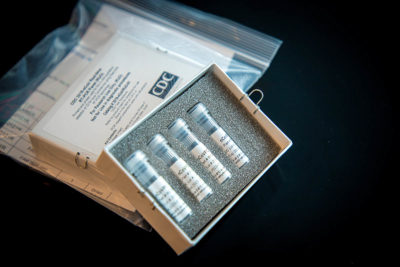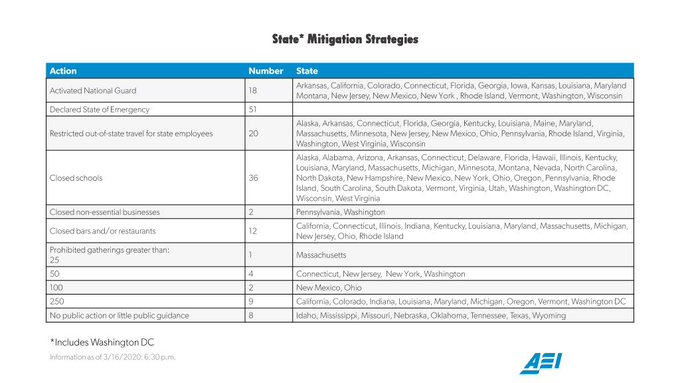During a Monday press briefing by the Colorado Department of Public Health and Environment (CDPHE), journalists got a sobering view of the COVID-19 pandemic and how prepared the state is to deal with this emergency. The state is activating two mobile testing units in Telluride and Routt County – to attempt to understand the spread of the virus. The Colorado National Guard is being tasked with helping to set up and man the testing centers.
As this was announced, the total number of Colorado cases testing positive reached 160, with 29 new cases identified on Monday, March 16. Mountain counties with high tourist loads have been most affected – Eagle, Summit, Pitkin and Gunnison counties in particular. Nationwide on Tuesday, positive cases jumped to 5,400 with 97 deaths at 3 p.m. By 7 p.m., those numbers had grown to 6,000, with 104 deaths.
Of critical importance is the state’s position relative to testing capacity for the coronavirus. The state confirms that since state lab testing began on Feb. 28, it has completed test results on only about 1,216 people by the state lab. The state acknowledges the need to test more people, in more places, and much faster. The problem is twofold: there aren’t enough kits, and there isn’t enough testing capacity.
Unanswered is the question of why this situation should surprise anyone. The federal government has been glacial in even acknowledging the crisis, let alone putting in place federal guidance until late last week. Even then it isn’t a strategic plan, but an uncoordinated attempt, forcing the states to the forefront of cohesive response.
According to COVID-19 Incident Commander Scott Bookmann, “We’re doing everything we can to ramp up testing capacity – sending out the specimens throughout the state and to private labs … we’re [still] doing everything at state labs, working through backlogs. The volume has been overwhelming and we haven’t gotten as much support from private partners as we expected to have. Their focus is working with their clinical partners and state labs are running 24/7.”
Therein lies one of the problems. State labs can only process 250 samples per day at capacity. The mathematical progression of this disease demonstrates the obvious – state labs cannot keep up. “At this point state labs are the only testing capacity in the state,” said Bookmann. “Children’s Hospital is working on getting more capacity up. Private labs have picked up 200 test samples, but there is not a timeline on when they can get us results.”
Bookmann explained the decision to send out mobile testing kits to the southwest and northwest portions of the state. “We’re sending in 200 test kits into these mountain communities to get an idea of the prevalence of the disease…It’s surveillance work while we await a new instrument coming from the federal government to increase our capacity.”
 Asked why more mobile testing sites weren’t being sent to Eagle County, especially since testing is taking five days for results there, Bookman said “In Eagle County area there is already widespread community transmission. The goal of a mobile lab is to go to other areas to inform our labs of the potential spread.”
Asked why more mobile testing sites weren’t being sent to Eagle County, especially since testing is taking five days for results there, Bookman said “In Eagle County area there is already widespread community transmission. The goal of a mobile lab is to go to other areas to inform our labs of the potential spread.”
Bookman added that the state is continuing to work on surging health care capacity for the health care system. “Everything we are doing as a state government is to make testing a top priority. We are doing everything we can to increase capacity, to support our clinical partners. We’re trying to get testing ramped up with LabCorp and Quest.”
He explained one of the earlier testing delays; “The bottleneck initially was in collecting the specimens – not just the test kits, but a matter of PPE (personal protective equipment) and the availability of negative air pressure rooms in hospitals to protect the collected samples.”
Bookmann said the role of the National Guard for the mobile testing areas is twofold. “It’s logistical support; the National Guard medical providers can swab, while our epidemiologists can provide the testing. They are a great partner.”
Bookmann discussed the coming shortages. “We’ll see a shortages of swabs and viral transport vehicles. PPE will become a concern…we’re doing what we can to get the supplies to continue to expand testing throughout the state.
He assured journalists on the call that “The healthcare system is doing everything they can to surge right now and we’re preparing to support them as needed.”
But when asked how many respiratory ventilators there are in Colorado, he said he didn’t know
Graphic image: With the weight of managing the spread of the COVID-19 crisis landing on the states, they have responded in different ways. Overnight, many of the states, including Colorado, moved to further limit gatherings of 10 people or more. Image by COVID-19 State Mitigation strategy team.







Recent Comments